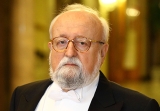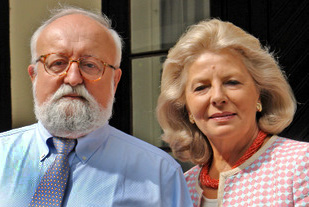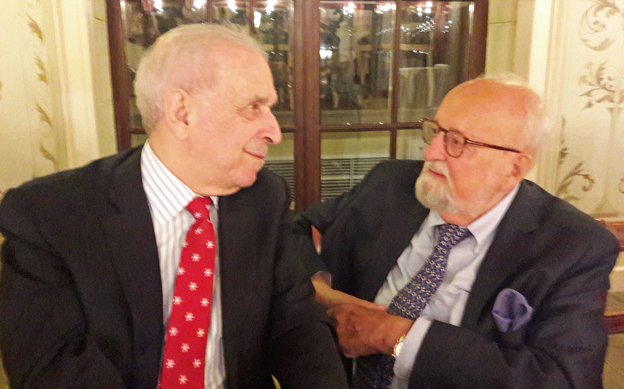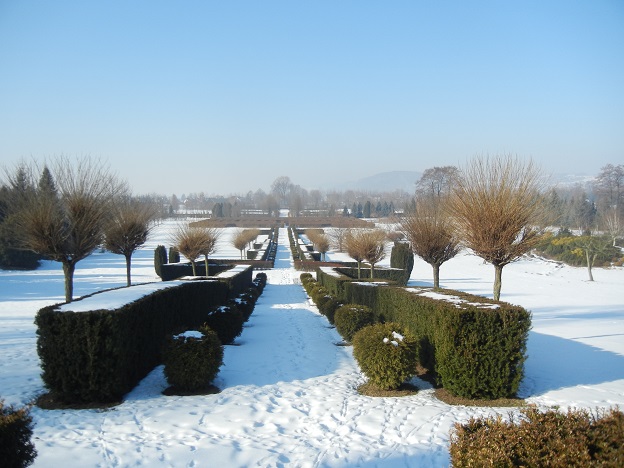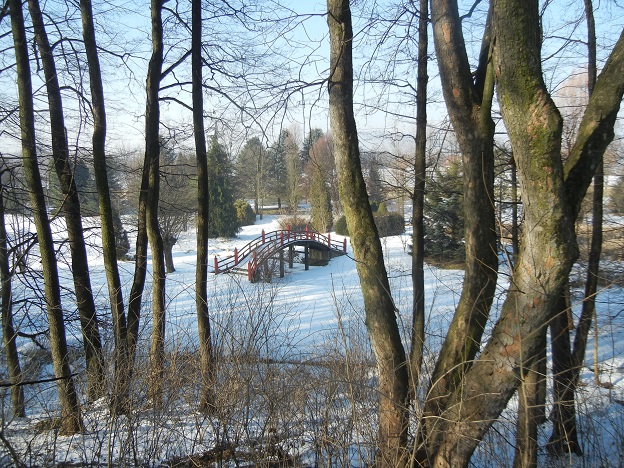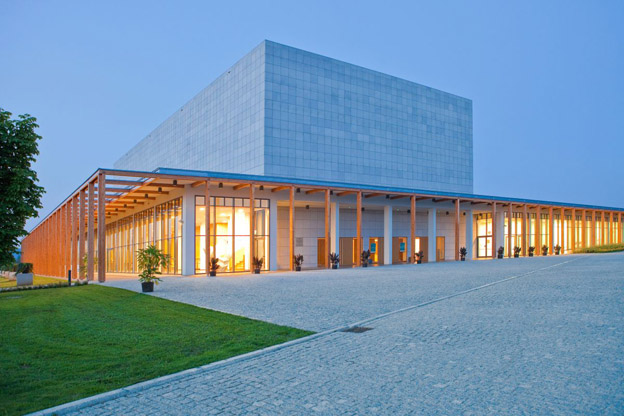Krzysztof Penderecki, one of the most outstanding contemporary composers died this morning at the age of 86. Born in 1933 in Dębica, he started composing at the age of 8. Here is his biography, with comments and memories from Remy Franck.
Penderecki achieved everything one could wish for as a composer, his works are performed all over the world and he was already in his lifetime a ‘classic’ of the 20th and 21st century. Krzysztof Penderecki composed outstanding oratorios, eight symphonies, stage and chamber music. Last year, in Warsaw, he told me that he had stopped composing but still had the wish to write at least one more work: his Ninth Symphony or another Passion.
He once told me: « I always write fast, that’s why I have composed so much. No, really, when I know where it’s going, when I’ve drawn up the plan, it goes fast, then it runs like clockwork. I am ambidextrous. When the right hand gets tired, I continue writing with the left. » Death prevented him from writing more works. He will take the plan of the so highly symbolic Ninth Symphony into his grave.
Krzysztof Penderecki is the author of breakthrough works of Polish sonorism, as well as outstanding oratorios, symphonic, stage and chamber music. He was born on 23 November 1933 to a family with Polish-German-Armenian roots. He once told me: « Well, as a child I wanted to become a virtuoso, I played the violin and also the trumpet. In my home town there was an amateur orchestra. My father, a lawyer, was a violinist in that formation. And then they lost their trumpet player and my father said: You have to learn trumpet quickly now. And I learned it. A week later I was already in the first rehearsal. Then I also played bassoon. Later, when I composed my first concerto, the Capriccio for flute and orchestra, it was the first in a long, long series of instrumental concertos. That was perhaps because I had not achieved what I wanted to do, namely to become a virtuoso. Perhaps I was too lazy to practice. And you don’t need to practice composing.»
In 1951, Penderecki came to Krakow to take lessons with Franciszek Skolyszewski, among others. « This is where the conscious learning of composition began, » the composer said. In 1955, he enrolled at the Music High School in Krakow. Soon after graduation he became an assistant at the Composition Department of Stanislaw Wiechowicz. In 1972 he was appointed rector of the Academy of Music. Pendrecki taught both at his home university and abroad – in Essen, Germany, and Yale, USA.
In 1959 Krzysztof Penderecki took part in the Polish Composers’ Union competition. The first prize was a passport and a scholarship in the West. Penderecki was determined to get the Prize and had a phenomenal idea, as he said in a Pizzicato interview. « I decided to write three works, completely different pieces and used three different names to register the pieces. Finally, all three compositions were awarded. One won the first prize, the other two works took second place ex aequo. It was one of the greatest days of my life! » This was the real start of his career as a young composer.
Over the following years Penderecki wrote a lot, still searching for his style. Soon famous sonoristic compositions were created – in 1960 Anaklasis and Threnody for the Victims of Hiroshima, in 1961 Polimorphia and in 1962 Fluorescence. This preoccupation with sound culminated in De Natura Sonoris I, which frequently calls upon the orchestra to use non-standard playing techniques to produce original sounds and colours. A sequel, De Natura Sonoris II, was composed in 1971: with its more limited orchestra, it incorporates more elements of post-Romanticism than its predecessor. This foreshadowed Penderecki’s renunciation of the avant-garde in the mid-1970s.
One of his greatest works from the first period was the St. Luke Passion (1963–66). A deep believer, Penderecki continued to write pieces that explored the sacred in music. In the early 1970s he wrote a Dies irae, a Magnificat, and Canticum Canticorum Salomonis (Song of Songs) for chorus and orchestra.
In the 1970s, while he was a professor at the Yale School of Music, Penderecki’s style began to change. The Violin Concerto No. 1 largely leaves behind the tone clusters. This direction continued with the Symphony No. 2, Christmas (1980).
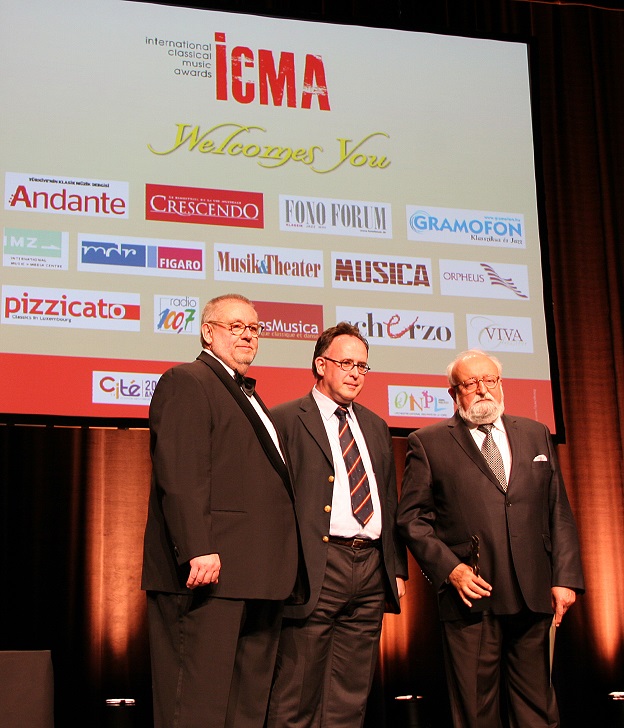
In 2012, Penderecki received the ICMA Lifetime Achievement Award. Here the composer is seen together wih ICMA President Remy Franck and Jury member Martin Hoffmeister (MDR)
His newer works were often called neo-romantic, though he did not like this description that much. He once explained this like this: « My Second Symphony was neo-romantic! But there are only, let’s say, two or three works that are so clearly neo-romantic, the Second Symphony, but above all the First Violin Concerto and perhaps the Te Deum. In the works I wrote afterwards, I have already said goodbye to this direction. But of course there is always something romantic in my music, you can find it in the Credo or the Polish Requiem. »
In 1980, Penderecki was commissioned by Solidarnosc to compose a piece to accompany the unveiling of a statue at the Gdansk shipyards to commemorate those killed in anti-government riots in 1970. Penderecki responded with Lacrimosa, which he later expanded into one of the best known works of his later period, the Polish Requiem.
Among the best-known works of recent years are the Cello Concerto No. 2, the Violin Concerto No. 2 and the Credo, his Trumpet Concerto and the symphonies Nos. 6, 7 (The Seven Gates of Jerusalem) and 8. The Eighth was commissioned by Luxembourg’s Government for the opening of the Philharmonie in Luxembourg. It has the subtile Lieder der Vergänglichkeit (Songs of Transience).
As a conductor, Krzysztof Penderecki debuted in 1971 in Donaueschingen. In 1972 he recorded some of his pieces for EMI with the National Symphonic Orchestra of Polish Radio from Katowice. He conducted many celebrated orchestras from all over the world, such as Müncher Philharmoniker, Sinfonieorchester des Norddeutschen Rundfunks in Hamburg, Sinfonieorchester des Mitteldeutschen Rundfunks in Leipzig, London Symphony Orchestra, Philadelphia Orchestra, New York Philharmonic Orchestra, Japanese Radio Orchestra (NHK) in Tokyo, Osaka Philharmonic Orchestra, Since 1998, he has been the main guest conductor of Sinfonieorchester des Norddeutschen Rundfunks in Hamburg.
In 2013, Dux published a CD box set containing all of the Penderecki’s symphonies, conducted by the composer himself. It was a sort of a gift from this recording label for Penderecki’s 80th birthday. The International Classical Music Awards awarded the box in the ‘Contemporary Music’ category.
Penderecki has three children, a daughter from his first marriage, and a son and daughter with his second wife, Elzbieta Penderecka, whom he married in 1965.
Penderecki lived in Luslawice, in South Poland, 100 kilometres east from Krakow, where he created his Arboretum, a huge park where he planted 1.800 species of trees and bushes. His Arboretum is inseparable from his music. In his house in Luslawice he composed all of his last works either in his study, on the terrace, in hiss mall pavilion or on a bench in the park.
Penderecki once said in a Pizzicato interview: « I have been interested in nature since I was a child. My grandfather was a forest ranger. He taught me the names of all the trees in Latin. When I was a student, I lost touch with nature a little. Then came my first successes, I traveled a lot. Finally I managed to buy a bigger piece of land, and more and more. I delved into the literature about trees, learned everything you need to plant such an Arboretum. My park has a precisely thought-out form, it was built according to a precise plan, which also takes into account the development of the trees. It’s like a score. When you write a note or a phrase, you have to know how it will look in the whole. And today the park is something like an unfinished symphony. I’m still looking to buy more land. I’m like the stamp collector trying to complete his collection as much as possible. »
In Luslawice composer Penderecki also initiated a musical centre for young musicians, built on his land, not far from his own manor and his superb Arboretum. The Krzysztof Penderecki European Center for Music, as it is called, is today an important venue hosting master-classes, workshops and concerts for and with young musicians, bearing at the same time a huge cultural influence on the entire region.
An exclusive Pizzicato interview from 2012 (in German) is available here.
Selected CD reviews (there are more, just search on Penderecki with our search tool)
Der Komponist der Nachdenklichkeit, der Sehnsucht und der Hoffnung
Anne-Sophie Mutters Geburtstagsgeschenk für Krzysztof Penderecki










